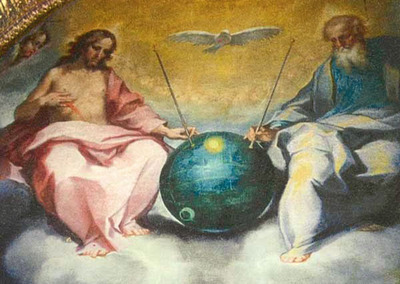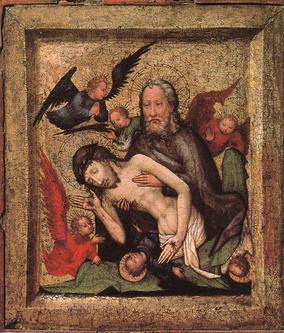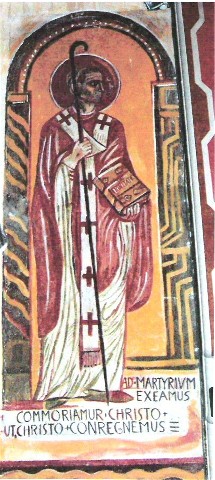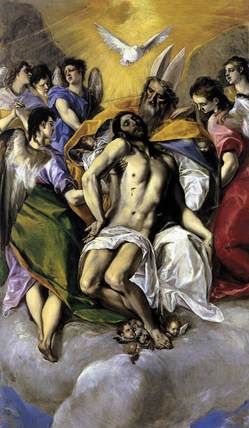Tag: Trinity
Can’t be called a Theist if you don’t believe in a Personal God
No one is to be called a Theist, who does not believe in a Personal God, whatever difficulty there may be in defining the word “Personal.” Now it is the belief of Catholics about the Supreme Being, that this essential characteristic of His Nature is reiterated in three distinct ways or modes; so that the Almighty God, instead of being One Person only, which is the teaching of Natural Religion, has Three Personalities, and is at once, according as we view him in the one or the other of them, the Father, the Son, and the Spirit–a Divine Three, who bear towards Each Other the several relations which those names indicate, and are {125} in that respect distinct from Each Other, and in that alone.
John Henry Newman
An Essay in aid of a Grammar of Assent, Chapter 5
The Feast of the Most Holy Trinity
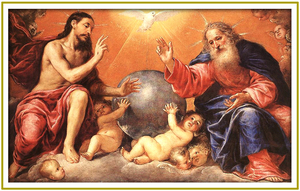 In the Sacraments of Initiation, God invites us to
In the Sacraments of Initiation, God invites us to
share in the life of the Most Blessed Trinity: we become recreated in the image
of Jesus Christ, filled with the Holy Spirit, and adopted as sons and daughters
of the Father.
Faith later in 2012, wrote: To profess faith in the Trinity – Father, Son and
Holy Spirit – is to believe in one God who is Love (cf. 1 Jn 4:8): the Father,
who in the fullness of time sent his Son for our salvation; Jesus Christ, who
in the mystery of his death and resurrection redeemed the world; the Holy
Spirit, who leads the Church across the centuries as we await the Lord’s
glorious return.
The Feast of the Most Holy Trinity
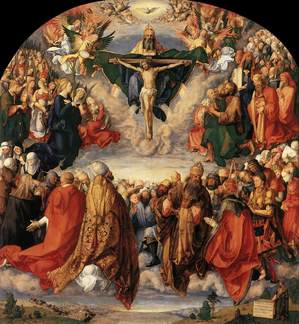 The Church celebrates her belief in the Most Holy Trinity, a communion of persons of Love. This feast given to us not to celebrate the revelation of an idea and divine works in history, but to meet in a personal way the community of the Trinity.
The Church celebrates her belief in the Most Holy Trinity, a communion of persons of Love. This feast given to us not to celebrate the revelation of an idea and divine works in history, but to meet in a personal way the community of the Trinity.
Prayer to the Trinity by Blessed Elizabeth of the Trinity
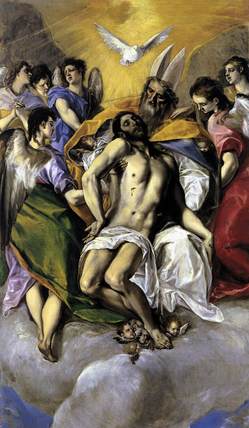 O my God, Trinity whom I adore; help me to forget myself entirely that I may be established in You as still and as peaceful as if my soul were already in eternity. May nothing trouble my peace or make me leave You, O my Unchanging One, but may each minute carry me further into the depths of Your mystery. Give peace to my soul; make it Your heaven, Your beloved dwelling and Your resting place. May I never leave You there alone but be wholly present, my faith wholly vigilant, wholly adoring, and wholly surrendered to Your creative Action.
O my God, Trinity whom I adore; help me to forget myself entirely that I may be established in You as still and as peaceful as if my soul were already in eternity. May nothing trouble my peace or make me leave You, O my Unchanging One, but may each minute carry me further into the depths of Your mystery. Give peace to my soul; make it Your heaven, Your beloved dwelling and Your resting place. May I never leave You there alone but be wholly present, my faith wholly vigilant, wholly adoring, and wholly surrendered to Your creative Action.
O my beloved Christ, crucified by love, I wish to be a bride for Your Heart; I wish to cover You with glory; I wish to love You…even unto death! But I feel my weakness, and I ask You to “clothe me with Yourself,” to identify my soul with all the movements of Your Soul, to overwhelm me, to possess me, to substitute yourself for me that my life may be but a radiance of Your Life. Come into me as Adorer, as Restorer, as Savior.
O Eternal Word, Word of my God, I want to spend my life in listening to You, to become wholly teachable that I may learn all from You. Then, through all nights, all voids, all helplessness, I want to gaze on You always and remain in Your great light. O my beloved Star, so fascinate me that I may not withdraw from Your radiance.
O consuming Fire, Spirit of Love, “come upon me,” and create in my soul a kind of incarnation of the Word: that I may be another humanity for Him in which He can renew His whole Mystery. And You, O Father, bend lovingly over Your poor little crature; “cover her with Your shadow,” seeing in her only the “Beloved in whom You are well pleased.”
O my Three, my All, my Beatitude, infinite Solitude, Immensity in which I lose myself, I surrender myself to You as Your prey. Bury Yourself in me that I may bury myself in You until I depart to contemplate in Your light the abyss of Your greatness.
(Blessed Elizabeth of the Trinity, 21 November 1904)
Trinity Sunday
 Almighty everlasting God, who granted to Your servants, in the profession of the true Faith, to recognize the glory of the eternal Trinity and to adore Its Unity in the might of majesty: we beseech You; that, in the steadfastness of that same Faith, we may always be defended from all adversities.
Almighty everlasting God, who granted to Your servants, in the profession of the true Faith, to recognize the glory of the eternal Trinity and to adore Its Unity in the might of majesty: we beseech You; that, in the steadfastness of that same Faith, we may always be defended from all adversities.
What do we, as Catholics, the Church, believe about the Holy Trinity? Much, in fact. Here are three paragraphs from the Catechism of the Catholic Church:
“The mystery of the Most Holy Trinity is the central mystery of Christian faith and life. It is the mystery of God in himself. It is therefore the source of all the other mysteries of faith, the light that enlightens them. It is the most fundamental and essential teaching in the ‘hierarchy of the truths of faith’. [GCD 43.] The whole history of salvation is identical with the history of the way and the means by which the one true God, Father, Son and Holy Spirit, reveals himself to men ‘and reconciles and unites with himself those who turn away from sin’. [GCD 47.]” (CCC 234)
“The Trinity is a mystery of faith in the strict sense, one of the ‘mysteries that are hidden in God, which can never be known unless they are revealed by God’. [Dei Filius 4: DS 3015.] To be sure, God has left traces of his Trinitarian being in his work of creation and in his Revelation throughout the Old Testament. But his inmost Being as Holy Trinity is a mystery that is inaccessible to reason alone or even to Israel’s faith before the Incarnation of God’s Son and the sending of the Holy Spirit.” (CCC 237)
“The whole divine economy is the common work of the three divine persons. For as the Trinity has only one and the same natures so too does it have only one and the same operation: ‘The Father, the Son and the Holy Spirit are not three principles of creation but one principle.’ [Council of Florence (1442): DS 1331; cf. Council of Constantinople II (553): DS 421.] However, each divine person performs the common work according to his unique personal property. Thus the Church confesses, following the New Testament, ‘one God and Father from whom all things are, and one Lord Jesus Christ, through whom all things are, and one Holy Spirit in whom all things are’. [Council of Constantinople II: DS 421.] It is above all the divine missions of the Son’s Incarnation and the gift of the Holy Spirit that show forth the properties of the divine persons.” (CCC 258)
Saint Hilary of Poitiers
Saint Hilary worked tirelessly to defend the faith from wrong-thinking Christians, typically called heretics. What follows is Hilary’s teaching on God the Father.
It is the Father from whom everything that exists has been
formed. He is in Christ and through Christ the source of all things. Moreover,
His being is in Himself and He does not derive what He is from anywhere else,
but possesses what He is from Himself and in Himself. He is infinite because He
Himself is not in anything and all things are within Him; He is always outside
of space because He is not restricted; He is always before time because time
comes from Him…. But, God is also present everywhere and is present in His
entirety wherever He is. Thus, He transcends the realm of understanding,
outside of whom nothing exists and of whom eternal being is always
characteristic. This is the true nature of the mystery of God; this is the name
of the impenetrable nature in the Father.
(On the Trinity, Bk. 2, Ch.6; ML 10,
54; FC XXV, 39-40)
The Liturgical prayer for Saint Hilary may be prayed here.
Humanity bears the profound mark of the Trinity
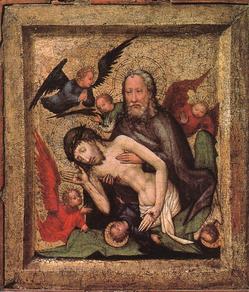 … we contemplate the Most Holy Trinity as Jesus
… we contemplate the Most Holy Trinity as Jesus
introduced us to it. He revealed to us that God is love “not in the
oneness of a single Person, but in the Trinity of one substance” (Preface).
He is the Creator and merciful Father; he is the Only-Begotten Son, eternal
Wisdom incarnate, who died and rose for us; he is the Holy Spirit who moves all
things, cosmos and history, toward their final, full recapitulation. Three
Persons who are one God because the Father is love, the Son is love, the Spirit
is love. God is wholly and only love, the purest, infinite and eternal love. He
does not live in splendid solitude but rather is an inexhaustible source of
life that is ceaselessly given and communicated. To a certain extent we can
perceive this by observing both the macro-universe: our earth, the planets, the
stars, the galaxies; and the micro-universe: cells, atoms, elementary
particles. The “name” of the Blessed Trinity is, in a certain sense,
imprinted upon all things because all that exists, down to the last particle,
is in relation; in this way we catch a glimpse of God as relationship and
ultimately, Creator Love. All things derive from love, aspire to love and move
impelled by love, though naturally with varying degrees of awareness and
freedom. “O Lord, our Lord, how majestic is your name in all the
earth!” (Ps 8: 1) the Psalmist exclaims. In speaking of the
“name”, the Bible refers to God himself, his truest identity. It is
an identity that shines upon the whole of Creation, in which all beings for the
very fact that they exist and because of the “fabric” of which they
are made point to a transcendent Principle, to eternal and infinite Life which
is given, in a word, to Love. “In him we live and move and have our
being”, St Paul said at the Areopagus of Athens (Acts 17: 28). The
strongest proof that we are made in the image of the Trinity is this: love
alone makes us happy because we live in a relationship, and we live to love and
to be loved. Borrowing an analogy from biology, we could say that imprinted
upon his “genome”, the human being bears a profound mark of the
Trinity, of God as Love.
Trinitarian love alone makes us happy
God does not live in splendid solitude… watch the rest here.
Solemnity of the Blessed Trinity
The Church professes her faith in the one God, who is at the
same time the Most Holy and ineffable Trinity of Persons: Father, Son and Holy
Spirit. The Church lives by this truth contained in the most ancient symbols of
faith. Paul VI recalled it in our times on the occasion of the 1900th
anniversary of the martyrdom of the holy Apostles Peter and Paul (1968), in the
symbol he presented which is universally known as the Credo of the People of
God.
Only “he who has wished to make himself known to us, and who
‘dwelling in light inaccessible’ (1 Timothy 6:16) is in himself above every
name, above every thing and above every created intellect…can give us right
and full knowledge of this reality by revealing himself as Father, Son and Holy
Spirit, in whose eternal life we are by grace called to share, here below in
the obscurity of faith and after death in eternal light.”
God is incomprehensible to us. He wished to reveal himself, not only as the one creator and Almighty Father, but also as Father, Son, and Holy Spirit. This revelation reveals in its essential source the truth about God, who is love: God is live in the interior life itself of the one divinity. This live is revealed as an ineffable communion of persons. This “mystery the most profound, the mystery of the intimate life of God himself” has been revealed to us by Jesus Christ: “He who is in the bosom of the Father, he has made him known” (John 1:18). The last words with which Christ concluded his earthly mission after the resurrection were addressed to the apostles, according to St. Matthew’s Gospel: “Go therefore and make disciples of all nations. Baptize them in the name of the Father and of the Son and of the Holy Spirit” (Matthew 28:119). These words began the Church’s mission and indicated her fundamental and constitutive task. The Church’s first task is to teach and baptize, to baptize means “to immerse” (therefore one baptizes with water) so that all may come to share God’s trinitarian life.
(Pope John Paul II, General Audience, October 9, 1985)
